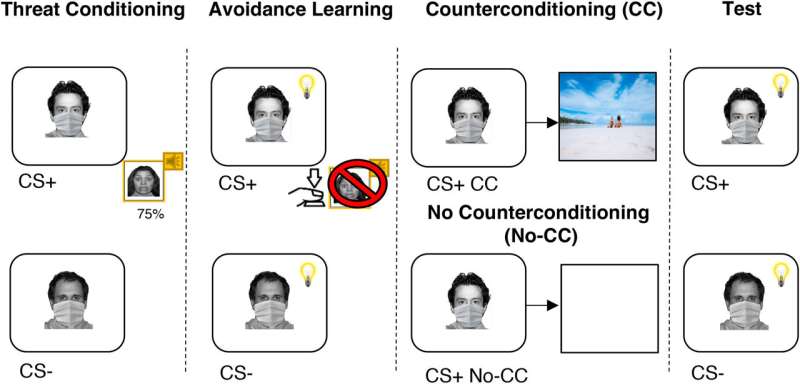An old technique offers a new way of overcoming COVID-19 fear and avoidance

An old technique of overcoming fears may have potential for ridding people of their fears and anxieties about COVID-19, a new Swansea University study has revealed.
The technique, called counterconditioning, was devised in the 1920s based on Ivan Pavlov's work with dogs on how fears are learned through the pairing of stimuli with unpleasant outcomes.
One of the early pioneers of counterconditioning, Mary Cover-Jones, found that she could successfully reduce a young child's fear of rabbits by allowing them to eat their favorite food in the presence of images of rabbits and actual rabbits which were gradually brought closer and closer.
The method successfully counters prior conditioning through gradual pairing with a pleasant, rewarding stimulus.
Despite its simplicity, research applications of counterconditioning are relatively rare. That is, until now. In a study conducted entirely online during one of the UK's periods of COVID-19 lockdown in 2021, Professor Simon Dymond and colleagues investigated whether this age-old technique could overcome people's fear of COVID-19 and reduce their avoidance of COVID-related situations.
To do so, the team recruited 123 people from across the UK between March and May 2021 who were at the time subject to national COVID-19 restrictions such as no household mixing, no travel, limits on social gatherings, and mandatory social distancing. Professor Dymond's team then established images of mask-wearing people as dangerous by pairing them with an unpleasant loud scream.
Then, to attempt to countercondition this learned fear, the team presented images of activities that people were currently prevented from doing, such as holding hands, hugging, kissing, sitting together on a holiday island, or celebrating indoors with a large group.
The team then tested to see if a group of people who received this counterconditioining felt less threatened and engaged in less avoidance than a group who did not receive counterconditioning. The results were clear: counterconditoning led to diminished expectation of threat and reduced avoidance relative to no-counterconditioning.
"This study shows that a simple, yet elegant, therapeutic method is helpful in overcoming pandemic-related fear and avoidance," said Professor Dymond who led the study with Dr. Gemma Cameron, Dr. Martyn Quigley, and Dr. Dan Zuj of the School of Psychology, Swansea University. "The fact that it can be delivered remotely—online—only adds to the enormous potential of counterconditioning in coping with the consequences of COVID-19."
The study has just been published open-access in the Journal of Behavior Therapy and Experimental Psychiatry.
More information: Gemma Cameron et al, Online counterconditioning with COVID-19-relevant stimuli in lockdown: Impact on threat expectancy, fear, and persistent avoidance, Journal of Behavior Therapy and Experimental Psychiatry (2022). DOI: 10.1016/j.jbtep.2022.101801




















